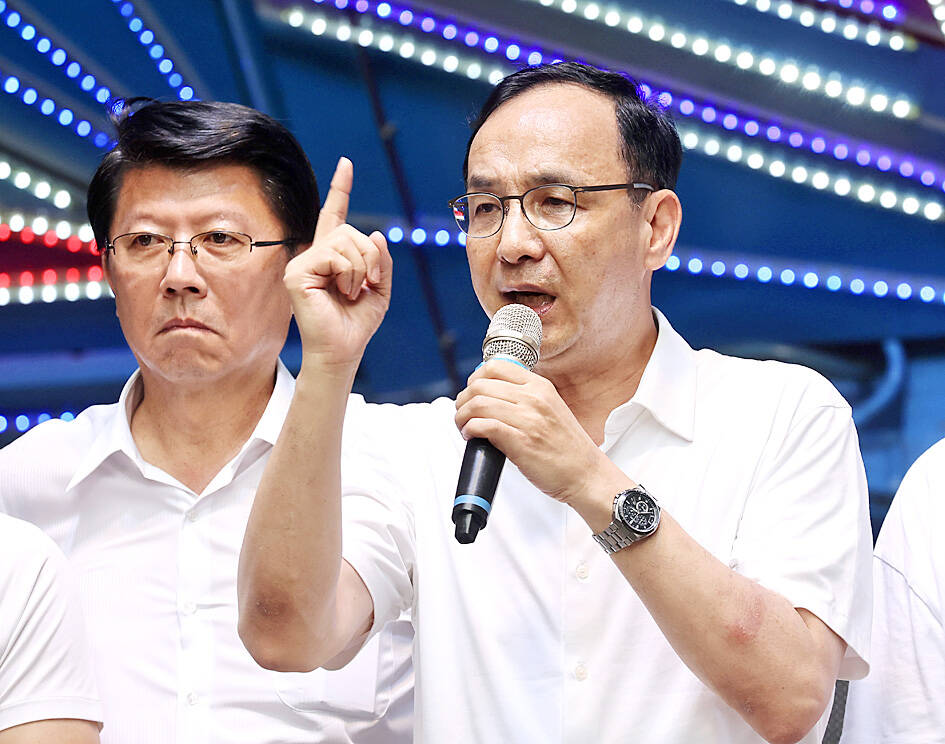President William Lai (賴清德) is working “the world’s weirdest democratic miracle” by choosing recalls over communication in resolving disagreements between the minority government and opposition parties, Chinese Nationalist Party (KMT) Chairman Eric Chu (朱立倫) said yesterday.
Chu made the remarks following an interview Lai had with the Mindi World News, released on Saturday ahead of the first anniversary of his presidential inauguration tomorrow.
In the interview, when asked whether the recall movement against KMT lawmakers is the only solution to a standoff between the Cabinet and the Legislative Yuan, Lai said that problems in a democracy must be resolved with democracy.

Photo: CNA
Democratic Progressive Party caucus whip Ker Chien-ming (柯建銘) early in January called for mass recalls to vote out KMT lawmakers.
Lai in the interview said the recall campaigns were initiated by citizens in response to multiple unconstitutional bills proposed by opposition lawmakers in the legislature, including amendments to the Act Governing the Legislative Yuan’s Power (立法院職權行使法) and the Act Governing the Allocation of Government Revenues and Expenditures (財政收支劃分法).
“The power of citizens is invaluable. They are exercising the rights granted to them by the Constitution, which include not only the right of election, but also rights of recall, initiative and referendum,” Lai said.
“This civic movement embodies the progress in Taiwan’s democratic system — a step forward from indirect democracy, or representative democracy, to direct democracy,” he said.
Regarding dialogue between the governing and opposition parties, Lai said the more communications, the better, but added that cross-caucus negotiations failed, as did his attempts to communicate with opposition parties after assuming office.
“The KMT and the [Taiwan People’s Party] hold a majority in the legislature and they would focus on running their own political agenda,” he said, adding that communications that were required by law were ineffective, as not all parties were willing to negotiate.
In response to Lai’s remarks, Chu said that no democratic country would be happy to see recall campaigns.
“Unfortunately, there seemed to be no words such as ‘parley,’ ‘communication’ or ‘dialogue’ in Lai’s dictionary over the past year,” he said, adding that “all Lai could see was competition.”
“Based on what Lai said, recalls would be the solution to ... the problems of the minority government. Is he trying to work the weirdest democratic miracle in the world?” he said.
When Chen Shui-bian (陳水扁) of the DPP was president from 2000 to 2008, he would face problems with the KMT head-on, and resolve them through meetings with opposition leaders, Chu said.
Lai does nothing but fight against opposition parties through recalls, he said.
“You lose an election, and you recall elected competitors and hold another election. Why not change the rules and make the election annual? That would be most convenient,” he joked.
Chu said that Lai has been unwilling to engage with opposition lawmakers.
“Whether it was a meeting on national affairs, a dialogue between the governing and opposition parties, or any other form of communication, Lai shut the door on the opposition’s proposals,” he said. “Is this so-called ‘greater democracy’? Or is it autocracy?”

The first two F-16V Bock 70 jets purchased from the US are expected to arrive in Taiwan around Double Ten National Day, which is on Oct. 10, a military source said yesterday. Of the 66 F-16V Block 70 jets purchased from the US, the first completed production in March, the source said, adding that since then three jets have been produced per month. Although there were reports of engine defects, the issue has been resolved, they said. After the jets arrive in Taiwan, they must first pass testing by the air force before they would officially become Taiwan’s property, they said. The air force

The Coast Guard Administration (CGA) yesterday said it had deployed patrol vessels to expel a China Coast Guard ship and a Chinese fishing boat near Pratas Island (Dongsha Island, 東沙群島) in the South China Sea. The China Coast Guard vessel was 28 nautical miles (52km) northeast of Pratas at 6:15am on Thursday, approaching the island’s restricted waters, which extend 24 nautical miles from its shoreline, the CGA’s Dongsha-Nansha Branch said in a statement. The Tainan, a 2,000-tonne cutter, was deployed by the CGA to shadow the Chinese ship, which left the area at 2:39pm on Friday, the statement said. At 6:31pm on Friday,

The Chinese People’s Liberation Army Navy’s (PLAN) third aircraft carrier, the Fujian, would pose a steep challenge to Taiwan’s ability to defend itself against a full-scale invasion, a defense expert said yesterday. Institute of National Defense and Security Research analyst Chieh Chung (揭仲) made the comment hours after the PLAN confirmed the carrier recently passed through the Taiwan Strait to conduct “scientific research tests and training missions” in the South China Sea. China has two carriers in operation — the Liaoning and the Shandong — with the Fujian undergoing sea trials. Although the PLAN needs time to train the Fujian’s air wing and

STRIKE: Some travel agencies in Taiwan said that they were aware of the situation in South Korea, and that group tours to the country were proceeding as planned A planned strike by airport personnel in South Korea has not affected group tours to the country from Taiwan, travel agencies said yesterday. They added that they were closely monitoring the situation. Personnel at 15 airports, including Seoul’s Incheon and Gimpo airports, are to go on strike. They announced at a news conference on Tuesday that the strike would begin on Friday next week and continue until the Mid-Autumn Festival next month. Some travel agencies in Taiwan, including Cola Tour, Lion Travel, SET Tour and ezTravel, said that they were aware of the situation in South Korea, and that group